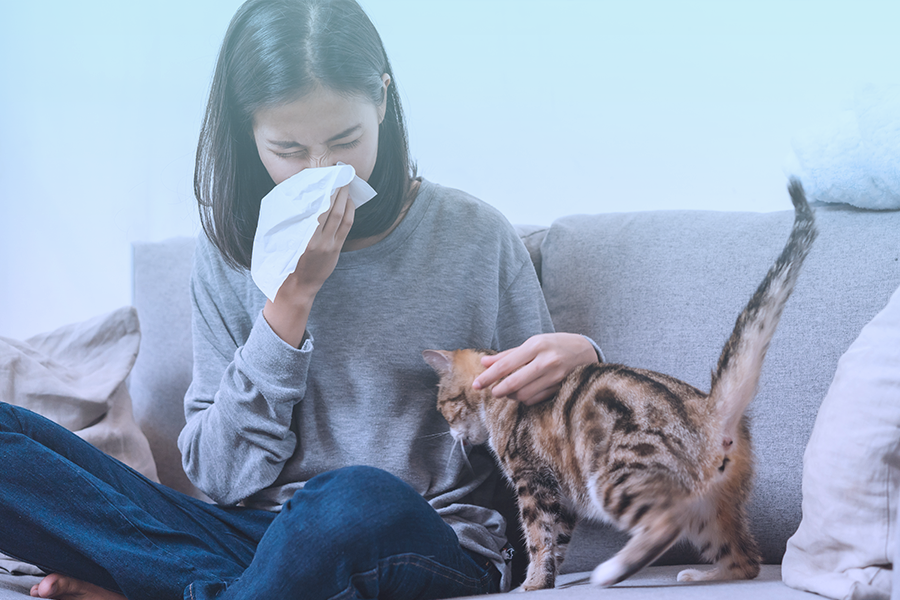Breathe Freely

Why Are Antihistamines Not Working For Me?
When allergy season rolls around, allergy sufferers worldwide reach for their bottle of antihistamine medications. But when these remedies don’t quite do the trick, many people are at a loss as to why they’re not getting results.
If you’re taking antihistamines and not finding relief, there are a number of factors that could be the cause: you might be developing new allergies, your allergies could be worsening, or the symptoms you’re experiencing could be the result of something other than allergies!
Here’s all you need to know about antihistamine allergy medications, why they don’t always work, and other approaches to treating chronic allergies.
What Are Antihistamines?
Antihistamines are common medications that treat allergy symptoms, including congestion, runny nose, sneezing, itchy eyes and throat, hives, rashes, and more. Many popular over-the-counter allergy medications are branded as antihistamines, including Benadryl, Zyrtec, Claritin, Allegra, and others.
How Do Antihistamines Help Treat Allergies?
When your body is exposed to an allergen like pollen, pet dander, mold, or dust, your immune system responds to this substance as a threat, releasing a chemical called histamine. Histamine triggers inflammation throughout your body in an effort to rid the body of this intruder. This inflammation causes increased mucus production and ultimately leads to allergy symptoms like itchy eyes, runny nose, and sneezing. Antihistamine medications work by decreasing the effects of histamine and reducing inflammation.
Many people treat allergies reactively, popping a pill when their eyes start itching or congestion begins. However, starting your allergy medicine before your allergies are triggered can help relieve symptoms quicker and more effectively—something doctors refer to as “pretreatment.” In other words, if you know allergy season is rolling in soon, start taking your antihistamines a few weeks prior.What Can Cause Antihistamines To Not Work?
There are several potential reasons an antihistamine allergy medication could stop working or become less effective in treating your allergy symptoms. Let’s unpack a few of them.
Antihistamine Tolerance
While there’s no established scientific evidence that your body can build up a tolerance to antihistamines, it is true that in the case of certain nasal sprays, increasing the dose can actually have a reverse effect. This worsening congestion after increasing nasal spray usage is called “rebound congestion.” Rebound congestion can also occur if you use nasal spray for a long period of time.
New or Worsening Allergies
If you have several different allergy triggers, your immune response can actually increase over time—especially if you’re exposed to multiple allergens simultaneously. You can also acquire new allergies as you get older. Both new and worsening allergies can impact the effectiveness of antihistamines and require a more aggressive treatment plan.
Nonallergic Rhinitis
Rhinitis is a fancy word for a stuffy, runny nose, due to irritation inside the nose—from a virus, allergies, or some other irritant. Sometimes our bodies react to substances that aren’t actually allergens, like pollution, smoke, chemicals, or perfume. While this reaction mimics allergies (you sneeze, get congested, and start coughing), your body isn’t releasing histamine. If you try to treat these non-allergic symptoms with an antihistamine, it’s not going to work because there’s no histamine to suppress!
Immune System Changes
Immune system changes due to aging, changes in lifestyle, or simple illnesses can affect your allergic response, making it stronger or more unpredictable. In turn, this can diminish the effectiveness of antihistamines.
Stress
Just like aging, stress can also increase sensitivity to allergens and strengthen your allergic response. This can weaken the effects of antihistamines, meaning you experience less relief than you would if stress weren’t part of the equation.
Environmental Changes
If you’ve recently moved to a new area, it’s likely filled with potential allergens that you’ve never encountered before. Even if you’ve lived in the same place for decades, warmer weather and longer growing seasons mean the pollen season is lasting a lot longer. And that’s not to mention the ways that pollution, drought, and other environmental factors can play a part in increasing allergy symptoms. All of these factors might make your antihistamines less effective.
Age
Allergies can worsen with age because of changes in the immune system and a decreased number of protective cells in the body. Greater exposure to allergens, whether outdoors or in, can also increase allergy symptoms. Additionally, chronic conditions like diabetes or asthma might worsen symptoms or lead to the onset of new allergies.
Skipping Doses
Antihistamines are most effective when you take them before the allergic reaction starts and then continue to take them throughout exposure (referred to as pretreatment, as mentioned before). It’s difficult to get symptoms back under control when you stop taking the medication or skip a dose—you might find symptoms quickly return or intensify. For best results, take antihistamines every day during your peak allergy season, and try to start prior to the onset of symptoms.

Other Types of Allergy Relief Beyond Antihistamines
If antihistamines aren’t doing the trick, there are other ways to alleviate allergy symptoms that range from simple lifestyle changes to an ongoing immunotherapy regime. Regardless of your approach, the first step in experiencing relief is to seek professional help. An allergy specialist can help you identify your unique triggers and find an effective and sustainable treatment plan. Here are a few allergy relief options your doctor may recommend:
Limited Exposure to Irritants
To reduce your exposure to allergens, it’s important to first understand what your body is reacting to. Is it the high pollen counts outside? Your roommate’s four-legged friend? Dust mites in your bedding? Or something else entirely? Once you know your triggers, you can reduce exposure with simple actions like checking the pollen count, closing your windows at night, washing your bedding once a week, showering when you get home, using an air purifier, and cleaning your house on a regular basis.
Alternative Medication
Sometimes, your immune system might respond better to a different antihistamine. The addition of a nasal spray or eye drops might also help to alleviate specific symptoms. For some allergy patients though, over-the-counter medications just aren’t enough. If this is you, it’s definitely worth speaking with your doctor about prescription-strength allergy medications and allergy medicines without antihistamines, including decongestants, nasal steroids, leukotriene modifiers, and corticosteroids.
Natural Remedies
While research is limited when it comes to the connection between allergies and natural remedies, some people find relief through certain herbal supplements, vitamins, nasal irrigation, and acupuncture. You should always talk to a medical professional prior to discontinuing allergy medications and before trying a natural remedy to limit any potential risks or adverse effects.
Lifestyle Modifications
Some lifestyle adjustments and additions can also help reduce allergy symptoms. Getting your blood flowing with regular exercise helps flush allergens out of the system quicker and reduces inflammation. Managing stress—through good sleep, rest, practicing meditation and mindfulness, and other stress-relieving strategies—can also help your immune system operate at full capacity and fight allergens effectively. Some dietary adjustments may also reduce allergy symptoms: an anti-inflammatory diet with fewer processed foods can strengthen your immune system and increase your overall ability to fight allergies.
Sublingual Immunotherapy
Sublingual immunotherapy, also known as allergy drops, is an effective way to treat your allergies at their root. Just like allergy shots, allergy drops gradually expose your immune system to small doses of your specific allergens. Over time, your body learns to stop reacting to these triggers, ultimately providing long-term relief from allergies.
At Quello, our team of doctors and allergy experts provides personalized allergy drop treatment so that you can live allergy-free. From start to finish, everything can be done from the comfort of your own home—allergy testing, drop delivery, and daily treatments.
Get Convenient, Lasting Allergy Relief With Quello
Are you tired of popping meds every time allergy season rolls around? Or are antihistamine allergy medications just not providing the relief you hope for? With Quello’s personalized approach to allergy treatment, you can experience lasting relief from allergies—no shots, no pills, no office visits, no wasted time.Here’s all there is to it:
- We mail you a free at-home blood test to determine your specific allergens.
- Once we receive your test, we’ll design allergy drops just for you and send them straight to your door.
- These daily drops relieve your symptoms and, over time, prevent them altogether.
- Our allergy experts are available all the time to answer your questions and celebrate victories with you!
We’ve helped thousands of people put allergies behind them for good. If you’re ready to enjoy a symptom-free life with a treatment that suits your lifestyle, give our free allergy test kit a try.

Overcome your allergies at home with our doctor-led therapy.
Get started with our free allergy test kitGet Started with no test needed.
Overcome your allergies at home with our doctor-led therapy.
Get started with our free allergy test kitGet Started with no test needed.




